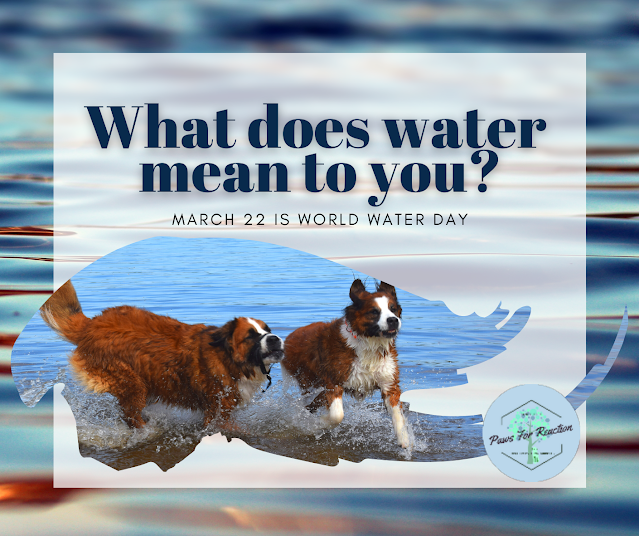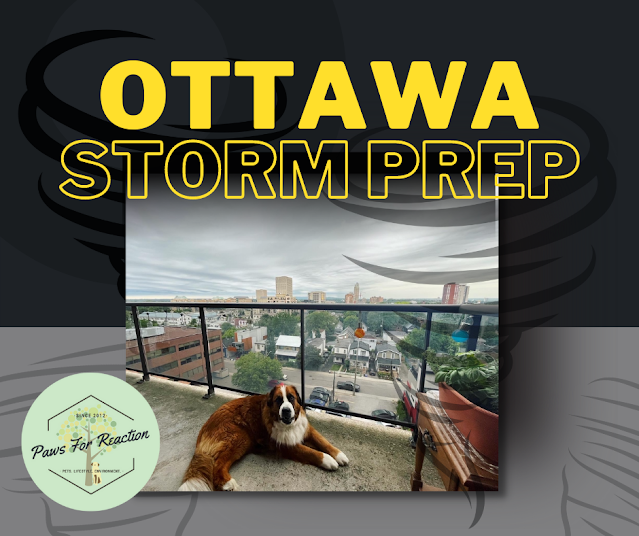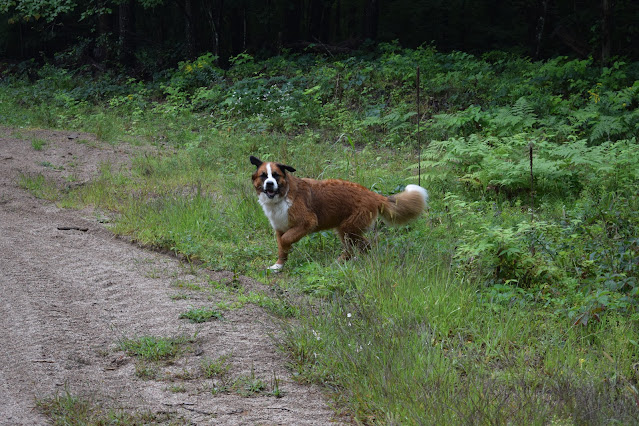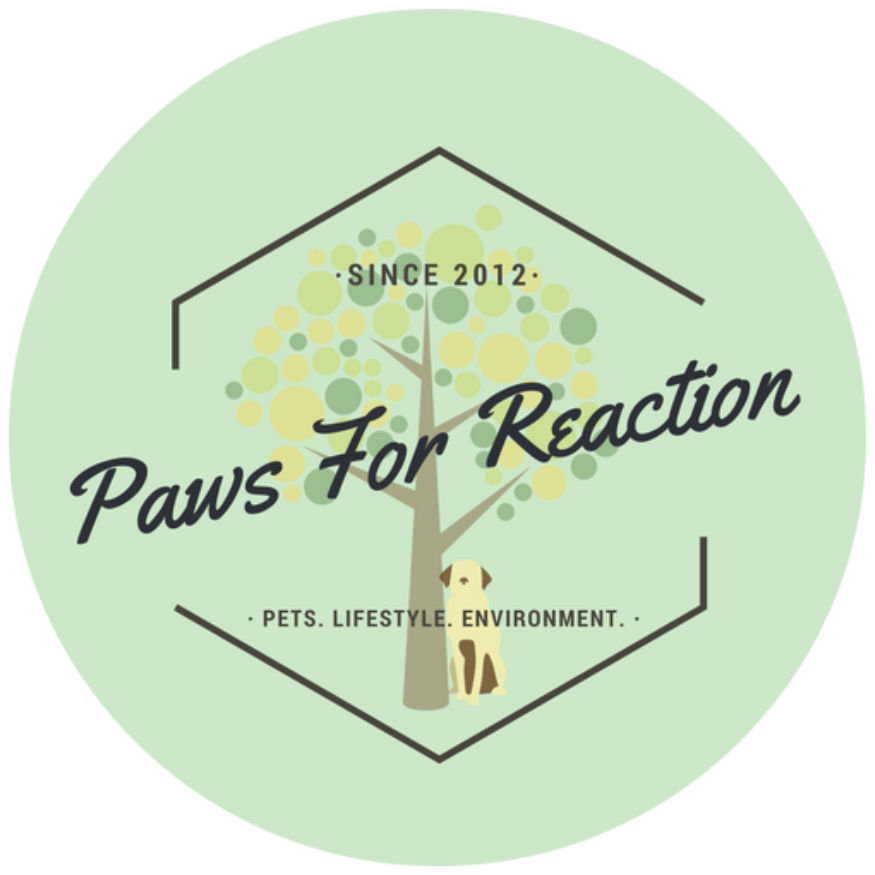Invest in our Planet: Embrace the 5 Rs of recycling on Earth Day
We grew up being taught the three Rs- Reduce, Reuse, and Recycle. That's where it all began. Fast forward to the present day. Pollution and human-caused climate change are far more devastating problems than we could have predicted. We are in a climate crisis, and three Rs aren’t enough.
.png) |
|
| Guest blog by Adeline Ee. Paws For Reaction is so lucky to have such an amazing writer & animal lover join extended our family!
|
|
Guest blog: Three native Ontario bee species in decline and how you can help
Today, August
20th, we celebrate the little, unsung heroes of our
ecosystems. It's the 13th annual World Honey Bee Day! The first World Honey Bee Day was held in 2009, and since then, we
have been giving a quiet nod of thanks on the third Saturday of August to
honey bees and their caretakers, the beekeepers.
Storm safety prep for you and your pets: What do I do during a tornado?
Ottawa is facing another severe thunderstorm today, Thursday, June 16, 2022, and meteorologists report that the storm will have all the ingredients for a "likely tornado." I want to share some quick storm prep tips for folks in the area- and their pets. It's important to prepare for the thunderstorm and a possible power outage or worst-case scenario- a tornado
Wild Wednesday: Ottawa Valley Wild Bird Care Centre is spreading its wings and flying to a new location
We wake to their song and watch their beauty paint the sky. Birds are a part of our everyday life. We may go months without seeing other wildlife, but not a day does by that we don't see several different species of birds. Injured and orphaned birds require very specific care, and when a bird is in need the Ottawa Valley Wild Bird Care Centre (OVWBCC) swoops in and takes it under its wing.
Happy Earth Day: Environmental stories for dog owners, animal lovers, and climate activists
It's the greenest day of the year- Earth Day! This is the second Earth Day, April 22nd, we've celebrated during the COVID-19 pandemic. It saddens me that a year later Ontario is in worse shape. I hope you find a safe way to do something positive for the planet today. Interested in learning more about living sustainably and fighting climate change? Check out the green headlines on Paws For Reaction! These are the best posts about climate change, pollution, wildlife, the outdoors, and environmental action.
Covid-19 and climate change: Pandemic's positive impacts on pollution were temporary, but damaging effects will be lasting
Climate change took a backseat in the media as the planet's greatest threat when the Covid-19 pandemic swept the globe in 2020. It's been more than a year since the first Covid-positive case was reported and we are entering another lockdown in Ontario. Looking back, I remember how optimistic I was the first time we entered a lockdown. Not just optimistic about the health and safety of our nation, but optimistic for the health of the planet. During that lockdown, we saw wildlife emerge from the wilderness and take their rightful place in our urban areas that were one their home. We saw marine life break the surface of the water in places it had not been seen before. The planet took a deep, cleansing breath.
Brown bag goes green: One Tree Planted for every compostable bag of Northern Biscuits to lower your carbon pawprint
Looking for a way to reduce your carbon pawprint that your dog will wag her tail about? Hazel's favourite Canadian dog treat company Northern Biscuit is celebrating Earth Month with a drool-worthy promotion. For every 1.36kg compostable bag of their five top-selling biscuits purchased in April, Northern Biscuits will plant a tree with One Tree Planted, a non-profit global re-forestation organization. The trees planted for this promotion will focus on Canadian regions to help promote cleaner air and support biodiversity. Forests provide habitat to over 80% of the world’s terrestrial biodiversity, and while this biodiversity doesn't include dogs, our dogs will be happy to explore the forest and snack on Northern Biscuits- all to help the planet.
Cleaning the Capital: Campaign on hold but litter collection doesn't have to be
I was excited to register for the Cleaning the Capital spring campaign and participate in city-wide trash collection during Earth Month. The pandemic delivered me another disappointment when the City of Ottawa announced the Cleaning the Capital Spring campaign would be placed on hold due to the current Ontario COVID-19 lockdown. My intention when I registered was to do trash collection on my own, so I could stay safe and physically distance from others. We are encouraged to only leave the home when it's essential, but I consider picking up litter in my neighborhood to be essential.
Food for thought: What's your carbon foodprint and how can you reduce it?
Here's something for you to chew on. One of the easiest ways to fight climate change is with a diet change. We all have a carbon foodprint. What we put in our mouth leaves a mark on our planet. Deforestation to make space for animal agriculture, energy and water consumption, transporting and storing food, the production process, pesticide use, and waste runoff created by farming, and unsustainable packaging are ways our food can harm the environment. Climate change will threaten our food security, causing an increase in weather-related disasters like floods and droughts. To keep food on our plates we need to take climate change off the menu.
Earth Day children's book list: Picture books about climate change for the next generation of environmental activists
Books are one of the most reused items in existence. We buy used books, borrow books from friends, and donate old books we've read already. E-books and audiobooks are sustainable and waste-free. Literature is important, but it can also be eco-friendly- especially when the book you are reading is all about caring for the planet. Getting people engaged with environmental action at a young age is the best way to ensure a sustainable future. Why not engage children during storytime?
Water is life: Take action to help end drinking water advisories in First Nation communities

We dip our toes in it. We listen to it rain down on our rooftops. We use it to brew our coffee, brush our teeth, wash our hands. Up to 60% of our bodies are made of it. Water is life. It's easy to take for granted because access to safe water is a basic human right. Or is it? The truth a little murkier. 61 indigenous communities in Canada are under water-boil advisories. They don't have clean water for drinking or sanitation, even though Canada is one of the most water-rich countries in the world. Some First Nation communities have lived with water advisories for more than a decade and are forced to boil water or use bottled water. Prime Minister Justin Trudeau reassured these communities that he would end the water advisories by March 2021, which would be a great way to celebrate World Water Day. Sadly, we won't be celebrating because the Canadian government says that Covid-19 may delay its target deadline. To those First Nation communities, water is a reason to make waves and take action. It's something they long for. It's a need not being fulfilled. Ask yourself this: What does water mean to you?
URGENT ACTION NEEDED: This just in from Ontario Nature, we need to save wetlands in Pickering
Developers are looking to destroy a large Provincially Significant Wetland in Pickering to make room for a warehousing facility. This is unacceptable but if we act fast we may be able to save these wetlands.
The regular person’s guide to becoming a climate activist

I’ve always felt a deep connection to nature. Growing up I was passionate about aquatic life and had an interest in wildlife extinction. I used to drag my little sister to the stream behind our housing development and collect samples to analyze. We would catch frogs and collect algae. Mostly we would get covered in mud despite my mother’s strict instructions to ‘not get dirty.’ I decided I was going to be a marine biologist when I grew up, long before my dreams of being a writer surfaced. The problem was I didn’t excel in science and math and I knew my grades would never reflect my passion. I had to set my scientist dreams aside. It was clear to me that my talents were limited to pen and paper. But my connection to nature never went away, and as I grew, that connection grew with me. I became aware of climate change and the harm humanity is inflicting on the planet and that the list of extinct animals is getting longer. I couldn’t sit back and watch without doing something. But what could I do? I’m just a regular person.
Do you have a story to tell? Share your story on Paws For Reaction
This year more than ever, I've been providing an outlet for people in the community to share their stories. I've teamed up with some wonderful and interesting guest bloggers, interviewed experts in their fields, and supported different organizations. I want to keep expanding upon that. That being said, Paws For Reaction is looking for new guest bloggers!
 |
Guest blog by Imani Hamilton.
So excited to welcome her to the Paws For Reaction extended family!
This post contains affiliate links, and I will be compensated if you
make a purchase after clicking on my links. |
Guest blog: Sustainable dog products for the New Year and beyond
Entering the New Year, climate action and environmental protection are more important than ever, as we collectively seek to reduce our carbon emissions by 65% and protect our precious ecosystems in time to prevent irreversible climate change. And yes, our furry companions have an environmental footprint that's worth reducing. The good news is, there are a few choices we can make in our suite of doggo basics that do make an environmental difference.
International guest blog: Agroecology farming and its contribution to climate change mitigation and sustainable food production
 |
International guest blog by Tulyahabwe Rogers (from Uganda, East Africa).
So excited to welcome him to the Paws For Reaction extended family! |
Severe, diverse, and location-specific impacts on agricultural production are anticipated with climate change. The last IPCC report indicates that the rise of carbon dioxide and associated greenhouse gases could lead to a 1.4 to 5.8 °C increase in global surface temperatures, with subsequent consequences on precipitation frequency and amounts. The 2013 report of the IPCC authoritatively re-affirms that climate change and variability will impact food and fiber production around the world due to the effects on plant growth and yield by the elevated carbon dioxide, higher temperatures, altered precipitation, and transpiration regimes, and increased frequency of extreme events, as well as modified weed, pest and pathogen pressure. Therefore, more durable benefits will likely result from radical agroecological measures that will strengthen the resilience of farmers and rural communities. Traditional farming systems are repositories of a wealth of principles and measures that can help modern agricultural systems become more resilient to climate change.
Democracy wins: We bid a not so farewell to Donald Trump as Joe Biden wins the 2020 USA presidential election- Adios Trump!
I've decided 273 is my new favourite number! Followers of my blog are well aware that I'm not a fan of Donald Trump. You may remember I fact-checked Trump on my blog a few years ago when he began attacking science and the Paris Agreement. Canadians care about what happens to our American neighbours because if the USA sneezes, Canada gets a cold. I'd like to give my American neighbours a virtual hug and congratulations because today, November 7, 2020, after a long wait in election purgatory (Groundhog Day much?) Joe Biden has been elected to become the 46th president of the United States of America.
Do you have a story to tell? Share your story on Paws For Reaction
This year more than ever, I've been providing an outlet for people in the community to share their stories. I've teamed up with some wonderful and interesting guest bloggers, interviewed experts in their fields, and supported different organizations. I want to keep expanding upon that. That being said, Paws For Reaction is looking for new guest bloggers!
Help from home: 5 ways you can help save Canada's wetlands, without getting wet
If you drank a glass of water today, washed dishes, flushed the toilet, boiled a pot, or filled up your dog's water dish, you probably benefited from a wetland. Wetlands are responsible for providing us with the clean water we drink and use every day. Ontario boasts 330,000 square kilometres of wetlands and currently accounts for about 25% of all the wetlands in Canada and 6% of global wetlands. Wetlands hold billions of litres of water that they help naturally filter and purify. They provide flood control, habitat and feeding ground for a variety of species, and act as carbon storage. I really enjoy hiking in the wetlands- they are wonderful recreational and educational ecosystems.
Help at home: It's a day of Global Climate Action, but what can we do in Ontario while sitting on our butts?
It's a day of Global Climate Action and I'm here to talk to you about butts... How many of you panic purchased toilet paper when the COVID-19 pandemic hit? I get it! Okay, I don't really get it that much- I didn't buy any extra toilet paper. I was thinking more about my respiratory system and less about my bottom. Next question. When you filled your Costco cart with stacks of bulk TP, extra soft, extra strong, how many of you thought about how toilet paper affects Ontario forests?

.png)




































